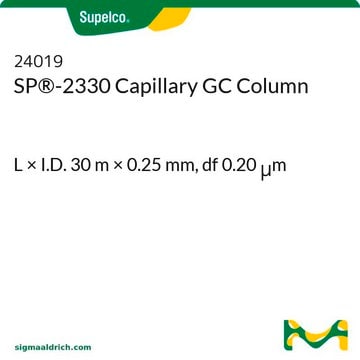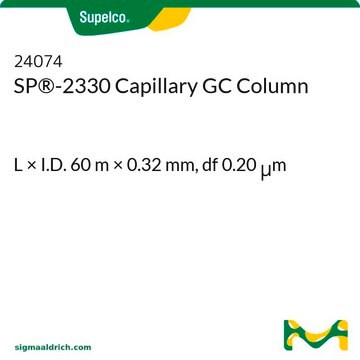24018
SP®-2330 GC-Kapillarsäule
L × I.D. 15 m × 0.25 mm, df 0.20 μm
Anmeldenzur Ansicht organisationsspezifischer und vertraglich vereinbarter Preise
Alle Fotos(1)
About This Item
UNSPSC-Code:
41115710
eCl@ss:
32119290
Empfohlene Produkte
Materialien
fused silica
Agentur
meets requirements for USP G8
Parameter
≤25-250 °C temperature (isothermal or programmed)
Beta-Wert
313
df
0.20 μm
Methode(n)
gas chromatography (GC): suitable
L × ID
15 m × 0.25 mm
Aktive Matrixgruppe
Non-bonded; poly (80% biscyanopropyl/20% cyanopropylphenyl siloxane) phase
Säulenart
capillary highly polar
Suchen Sie nach ähnlichen Produkten? Aufrufen Leitfaden zum Produktvergleich
Verwandte Kategorien
Allgemeine Beschreibung
Capillary GC column is also known as open tubular column. The carrier gas flows through the central aperture and is unrestricted throughout the length of the column.
Anwendung: Supelco bietet das branchenweit umfangreichste Sortiment an Biscyanopropylphasen. Diese Säule ist eine hochspezialisierte Säule, die aufgrund der Substitution von Biscyanopropyl- und Phenylgruppen auf dem Polymergerüst sowohl polare als auch polarisierbare Eigenschaften aufweist. Sie kann sowohl für Hoch- als auch für Niedrigtemperaturtrennungen von Analyten wie geometrischen Isomeren von Fettsäuremethylestern (FAMEs), Dioxinen und aromatischen Verbindungen verwendet werden.
USP-Code: Diese Säule erfüllt die Anforderungen von USP G8.
Phase:
USP-Code: Diese Säule erfüllt die Anforderungen von USP G8.
Phase:
- Nicht gebunden
- Poly(80% Biscyanpropyl/20% Cyanpropylphenylsiloxan)
- Umgebungstemperatur bis 250 °C (isothermal oder programmiert)
Anwendung
Capillary column of SP®-2330 is suitable for being used in gas-liquid chromatography (GLC), used for separation of partially methylated alditol acetates.
Sonstige Hinweise
We offer a variety of chromatography accessories including analytical syringes
Rechtliche Hinweise
SP is a registered trademark of Sigma-Aldrich Co. LLC
Hier finden Sie alle aktuellen Versionen:
Besitzen Sie dieses Produkt bereits?
In der Dokumentenbibliothek finden Sie die Dokumentation zu den Produkten, die Sie kürzlich erworben haben.
G Bellomonte et al.
International journal for vitamin and nutrition research. Internationale Zeitschrift fur Vitamin- und Ernahrungsforschung. Journal international de vitaminologie et de nutrition, 61(1), 91-97 (1991-01-01)
The aim of this paper is to develop a gas chromatographic method for the quantitative determination of linoleic acid in adapted, preterm, follow-up and special infant formulas. For sample preparation, lipids were extracted with a Soxhlet extractor after acid hydrolysis
M Martinez et al.
Journal of neuroscience research, 20(4), 484-490 (1988-08-01)
The total fatty acid composition of the human retina was studied during early normal development and compared to that found in infancy and in adulthood. The retina of an infant undernourished prenatally and of two malnourished postnatally were also studied
A Spangelo et al.
Journal of dairy science, 69(7), 1787-1792 (1986-07-01)
A quantitative method for determination of free fatty acids in milk is described. Free fatty acids and some glycerides were extracted from milk in acetonitrile in the presence of sulfuric acid and anhydrous sodium sulfate. The filtered extract was evaporated
M M Pope et al.
Journal of chemical ecology, 8(7), 1043-1055 (1982-07-01)
Sex pheromone gland volatiles from individualHeliothis virescens (F.) females were collected and analyzed on an SP-2330 capillary gas-liquid chromatography column for identification and quantification of the compounds emitted. Only four of the seven compounds previously reported as pheromone components appeared
Analytical methods for structure and biosynthesis. Science and Technology of Fructans.
Suzuki MN and Chatterton J.
Technology & Engineering, 111-112 (1993)
Unser Team von Wissenschaftlern verfügt über Erfahrung in allen Forschungsbereichen einschließlich Life Science, Materialwissenschaften, chemischer Synthese, Chromatographie, Analytik und vielen mehr..
Setzen Sie sich mit dem technischen Dienst in Verbindung.





